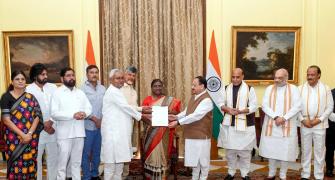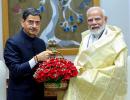'The lack of a majority isn't the issue. He has enough in 240, especially as none of his allies can pull down his coalition.'
'That's why he's started as if this were just another, normal term. That pretence is vital for him.'
'The change for Modi 3.0 comes not from numbers, but from the new environment of contestation,' points out Shekhar Gupta.

Prime Minister Narendra Modi's third term is well under way. He knows better than any other that this term is fundamentally different from the first two, sort of sui generis.
His political training and experience haven't prepared him to run an arrangement like this.
The lack of a majority isn't the issue. He has enough in 240, especially as none of his allies can pull down his coalition.
That's why he's started as if this were just another, normal term. That pretence is vital for him.
The change for Modi 3.0 comes not from numbers, but from the new environment of contestation.
To try and understand this better, we will mix metaphors from different sports. Contact sports first, because that's what politics is.
The Bharatiya Janata Party and partners won a points victory as if in a boxing match.
The victory wasn't narrow. But it was no quick knockout like the last two. Their rivals were able to land some punches, are still in the ring, on their feet, and fighting.
They also believe the reigning 'champion"'is beatable. This is the change now.
You can see it in how Rahul Gandhi and others in the INDIA bloc are already in the political street.
In 2014 and 2019, they had melted away to lick their wounds or were in some deep, distant spiritual contemplation.
Now we switch from contact sports to the more familiar cricket.
Think of the 2024 verdict as a qualifier in which the Opposition earned the right to challenge the title-holder in a kind of Test championship final.
Test cricket is played one session at a time. In this Test, the first session will be the three state elections later this year: Maharashtra, Haryana, and Jharkhand.
In each, the rivals are resurgent. We are not listing Jammu and Kashmir here. It brings formidable but different challenges.
As soon as this session ends, the buildup begins for the next -- Delhi at the start of next year.
The incarceration of Arvind Kejriwal and Manish Sisodia has given the contest a special edge.
There will then be a bit of a breather before the final session of this 'day one' begins in Bihar in September.
Whoever wins at least two of these three sessions will have momentum towards 2029.
Mr Modi enters this term with multiple new challenges continuing from the election campaign.
Among the many adjustments the party will need to make is a change in its approach to lawmaking.
The era of passing important laws by shock and awe has gone into a hiatus.
Constitutional amendments, even where needed and justified, might need to wait.
After the '400 paar' call caused widespread insecurity about the Constitution, the government will be wary of even proposing any amendments for some time.
Of course, one solution would be to consult the Opposition and take them on board.
That would call for a change in the basic structure of BJP politics in the Modi era.

The first Parliament session did not hold out any such comfort for now.
If anything, it indicated a phase of the two sides being locked in a bitter tussle, like constant combatants with no flexibility, no back channel and zero trust.
Of all of the political challenges for the new government, there is nothing stronger than what we might call the 'jai jawan/jai kisan trap'.
For two decades, Mr Modi built for himself the image of a champion of farmers and the armed forces.
This election showed it unravelling as the party suffered its biggest reverses in agricultural and soldiering powerhouse states like Uttar Pradesh, Maharashtra, Haryana, and Rajasthan, and even Punjab.
The initial promise of doubling farmers' income by 2022 fell by the wayside, and the discourse on farm reform was ruined by the farm laws (however virtuous) brought in via the ordinance route and then railroaded through Parliament.
Can Mr Modi revisit those and engage with the Opposition? And if he does, what will his base think?
It's also unlikely that a rejuvenated Opposition will respond constructively.
Not when there is another session in the match to play out after every break.
It will be a disappointment, on the other hand, if the government now responds with more agri-populism: Higher and wider MSP (minimum support price) offers and loan waivers, while at the same time submitting to the Swadeshi Luddite veto on biotechnology, especially GM (genetically modified) seeds.
The courageous report by the State Bank of India's economic research division shows the way on agriculture.
SBI underlines how the MSP approach works for too few farmers and accounts for no more than 6 per cent of our farm output, and that the future lies in much bolder reform, a move to the markets and away from MSP, not the other way around.

Has this BJP's politics left it room for manoeuvre on an issue like this?
In Shivraj Singh Chouhan, at least the party has made a good choice for agriculture minister.
In nearly two decades as chief minister, he turned around agriculture in Madhya Pradesh. He is also generally seen as affable, conciliatory, and politically deft.
He's among the last in this BJP to have been moulded in the Vajpayee era.
It will be tough but a pleasant surprise if he is given a wide enough mandate on this.
If the setbacks with the kisan issue emerged from the failed farm laws, the negativity on the jawan issue also emanates from similar arrogant haste.
A shorter tenure of service for the armed forces, especially for 'Other Ranks', is an idea whose time had come three decades back.
It does indeed control spiralling pensions, sparing more for modernisation.
But its larger gain is also in keeping the armed forces younger (today's average age, 33, is too old) and more in tune with changing technologies.
Further, it gives more young Indians an opportunity to serve in the armed forces and come out more employable and skilled.
Like the farm laws, it is also blighted by a lack of discussion. Much will be changed with Agnipath now.
How do you, for example, justify two sets of soldiers from the same unit in the same bunker, hit by the same bomb, and their families drawing different compensation?
Was it necessary for them to wear different insignias, thereby creating two classes?

There was a ready model available in the emergency and short-service commission for officers, where everybody was the same while in service, but had different tenures and terminal benefits based on the length of service.
A massive change like this will always bring challenges, but a more patient and all-stakeholders approach would have minimised these.
This Modi government will need to address these massive challenges without the total power it got used to, under relentless attack, one session after another.
And we know the pitch often deteriorates with time. That's why this third term is nothing like the first two.
By special arrangement with The Print
Feature Presentation: Aslam Hunani/Rediff.com










